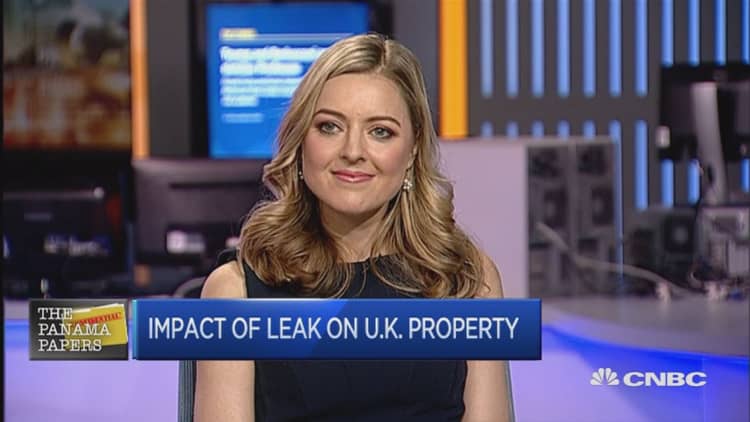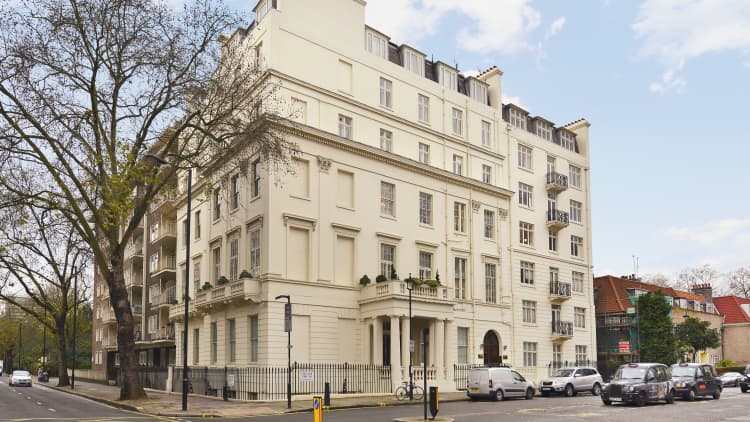
The spotlight on the London property market as a destination for colossal sums of money has intensified after the so-called Panama Papers leak.
The documents — more than 11.5 million encrypted internal documents from Mossack Fonseca, a Panamanian law firm — have led to various reports detailing the foreign ownership of multiple prime London properties, sparking fears that some multimillion-dollar deals are being financed with laundered money.
The U.K.'s Guardian newspaper — one of the teams that has been analyzing the documents — reported last week that around 2,800 Mossack Fonseca companies appear on a U.K. land registry list of overseas property owners dating from 2014. The Financial Times also reported that associates of Bashar al-Assad, the Syrian president, had bought property in the capital. CNBC has not been able to independently verify the allegations.
The money-laundering process involves processing money from a criminal or sanctioned sources and shuffling it from country to country and company to company until its original source cannot be traced.

London property is a compelling choice for criminals looking to make dirty money clean, according to law enforcement agencies. In addition to a system that that can make it possible to disguise which individual ultimately owns a U.K. property, the country's political stability, image of respectability and lavish lifestyle offerings make the capital an attractive place to buy a trophy asset.
The city also has a highly competent and extensive professional services industry to provide all of the financial, advisory and legal support necessary to buy a house. These agents are tasked with raising red flags if they suspect corrupt money is in play but United Nations data show only a minuscule fraction of deals involving laundered money are ever flagged.
The United Nations estimates only 1 percent of global laundered money flows are detected. The contribution from U.K. estate agents was a total of 355 suspicious activity reports in 2015, equating to 0.09 percent of all the reports filed in 2015, according to the National Crime Agency.
The U.K. government has made some attempts to improve transparency by creating a publicly accessible database that will be launched later this year which will show the ultimate owners of U.K.-registered companies. However, this will not help unravel who owns the 36,342 London properties held by offshore registered companies.
"For these measures to have teeth, the government must force the U.K.'s tax havens to set up the same registers, or we simply move the secrecy offshore." Chido Dunn, senior campaigner at NGO Global Witness said to CNBC via email.
Rachel Davies, head of U.K. advocacy and research at the U.K. arm of the global non-governmental organization Transparency International agrees, telling CNBC via email that "this will make it much harder for corrupt individuals to use London as a safe haven for their illicit wealth."
"The impact of this damages the lives of people in the countries of origin, who have their resources and national budgets plundered by corrupt individuals, but it is also likely that this has skewed London property prices, pricing locals out of the market," she said.
Indeed, the rampant growth in London property prices support this assertion. At the turn of the century, according to Nationwide data, the average first-time buyers' house price was at a 4.3 multiple of their average salary. Now that figure has billowed out to around 10.1.
Another negative side effect is said to be a prioritization in recent years by U.K. developers of building luxury developments instead of desperately needed affordable accommodation in response to the demand for prime properties, often from offshore registered vehicles.
Transparency International cites house price manipulation and the growth of "ghost" areas as concerns. Indeed, an Evening Standard investigation in 2014 revealed £3 billion worth of London mansions sit empty, with the negative knock-on effects for local services and communities.
At a time of such an acute housing shortage and the rapidly declining ability of those who work and pay taxes in London to afford a house to live in, the clamor is growing for a tightening of rules to stop illicit money soaking up London property. The Panama Papers' revelations have added momentum to those demands.




